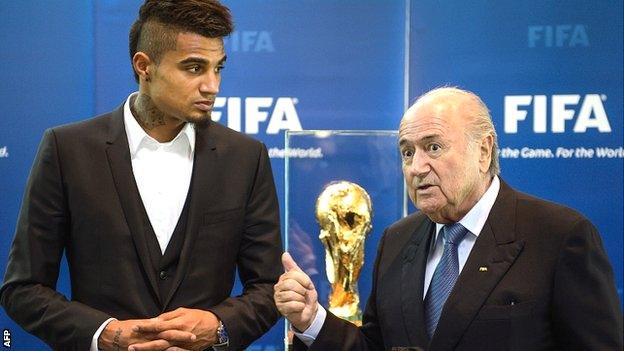Referees can stop matches for racist incidents - Uefa
- Published

Uefa has recommended that referees stop matches when there are incidents of racism and says it will "fully support" them if they follow its advice.
European football's governing body reminded officials they had been authorised four years ago to halt games in case of serious racism incidents.
It also urged coaches and players to speak out "even if it meant criticising their own players and fans".
In 2009, Uefa outlined a three-step procedure for abandoning games.
It said the referee should first stop the match and ask for announcements to be made over the public address system.
The second step would be to suspend the match for a given period of time and, finally, abandon it.
Uefa reiterated its position on Thursday in a resolution issued in conjunction with the European Clubs Association (ECA) and the world players' union, FIFPro.
The resolution was drawn up by the Professional Football Strategy Council (PFSC) and ratified by Uefa's executive committee, meeting in Bulgaria, on Thursday. The PFSC is composed of representatives from Uefa, the national leagues, European clubs and the players.
So far, no Uefa-organised match has ever been abandoned and, despite the guidelines, there have been several games where play has continued despite racist chanting, including a recent match between Inter Milan and Tottenham in the Europa League.
AC Milan's Kevin-Prince Boateng walked off in disgust having been racially abused by fans during a friendly with Italian lower-division side Pro Patria in January and the game was abandoned.
The resolution also called on Uefa, national associations and leagues to provide new regulations which allow for stricter sanctions in cases of racism.
"Many countries have taken significant and successful action but such incidents are still widespread in our continent," it added.
"[The resolution] calls on the players and coaches - namely those with most influence on the perpetrators of racist acts - to speak out, even if this may mean criticising their own fans or players.
"Finally, the PFSC acknowledges that racism is one form of discrimination, but that, unfortunately, other forms of discrimination also manifest themselves from time to time in football.
"It expresses its full and unconditional opposition to any form of discrimination."
- Published22 March 2013
- Published21 March 2013
- Published2 March 2013
- Published2 March 2013
- Published4 January 2013
- Published3 January 2013